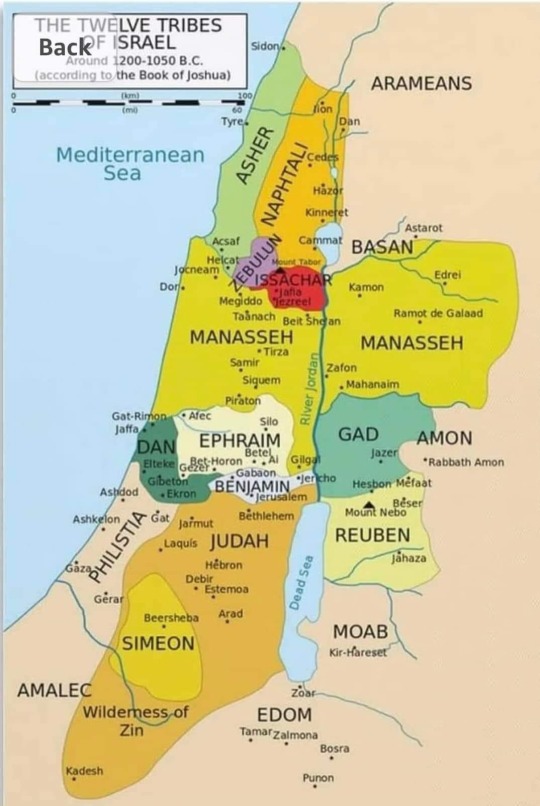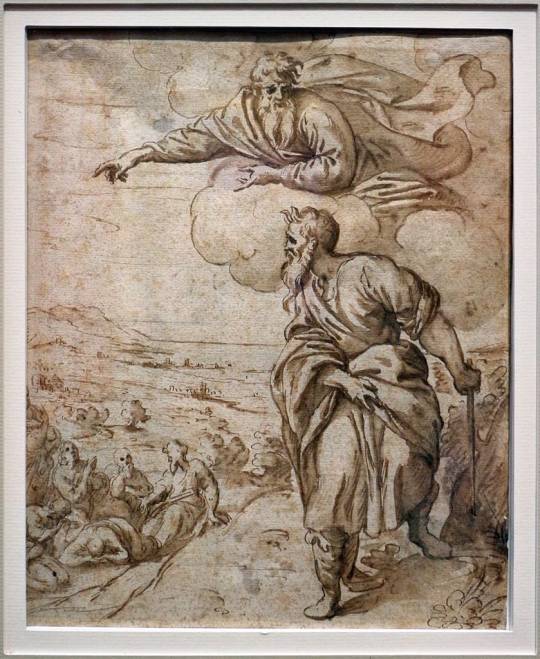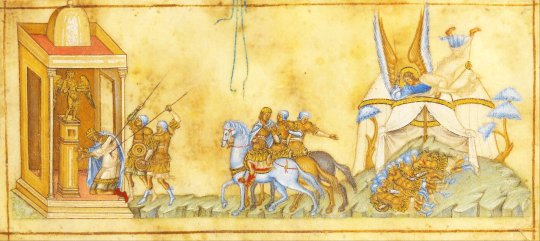#kingdom of judah
Explore tagged Tumblr posts
Text
people who try to play the “but jewish people were here 3000 years ago” card really need to learn what christians and muslims are.
christianity branched from judaism like 2000 years ago.
and islam branched from christianity like 1400 years ago.
you could say jewish people were here 3000 years ago but that’s like saying europeans have the right to africa’s land because humans were there 20,000 years ago!! at some point you went too far back and who was or wasn’t there doesn’t matter anymore.
especially when the religion you’re trying to discredit haven’t branched from your religion yet so they’re part of the “jewish people” you’re referring to!!
533 notes
·
View notes
Text
The land of Israel has been populated by the Jewish people since 2000 BCE. Here's the timeline, in case you didn't realize that it is their homeland.
1900 BCE:
- Abraham chosen by G-d as the Father of the Jewish Nation.
1900 BCE:
- Isaac, Abraham's son, rules over Israel.
1850 BCE:
- Jacob, son of Issac, rules over Israel.
1400 BCE:
- Moses leads the people out of Egypt and back to Israel.
1010 BCE:
- King David unites the 12 tribes into one nation.
970 BCE:
- King Solomon, son of David, builds the first temple structure in Jerusalem
930 BCE:
- Israel is divided into two kingdoms, the Kingdom of Israel and the Kingdom of Judah.
722 BCE:
- Kingdom of Israel is conquered by Assyrians.
605 BCE:
- Kingdom of Judah is conquered by the Babylonians.
586 BCE:
- Solomon's Temple is destroyed by the Babylonians.
539 BCE:
- Persians conquer the Babylonians and take control of Israel.
538 BCE:
- The Jews return to Israel from exile.
520 BCE:
- The Temple is rebuilt.
432 BCE:
- The last group of Jews return from exile.
333 BCE:
- The Greeks conquer the Persian empire.
323 BCE:
- The Egyptian and Syrian empires take over Israel.
167 BC:
- Hasmoneans recapture Israel, and the Jews rule independently.
70 BCE:
- Romans conquer Israel.
70 CE:
- Romans destroy the temple.
After that, the Jewish people were captives to the Romans, Byzantines, Arabs, and Crusaders. Through all of these events, the Jewish people continued to live in Israel. There were more or fewer of them, depending on the centuries, but there was never a time when the Jews didn't live in the land.
They stayed, they built their communities, they raised their families, practiced their faith and they suffered at the hands of many outside rulers, but they always kept their faith. It is what sustains them, even now.
May 1948 CE:
- the UN established the State of Israel, the sovereign nation of the Jews.
Don't buy the Palestinian lies that they are entitled to the land. It simply is not true. HaShem will also provide a way for his chosen people to live in Israel, as He has for thousands of years.
Based off of a post by Raymond García of Julesburg, Colorado USA

#israel#secular-jew#jewish#judaism#israeli#jerusalem#diaspora#secular jew#secularjew#islam#judea#Samaria#ancient history#history#Israeli history#Israël history#Palestine#Isaac#Jacob#Solomon#king solomon#king David#Esther#bible#torah#Abraham#hebron#kingdom of Judah#Judah#temple
39 notes
·
View notes
Text
A wonder from ancient Canaan
This Iron Age temple of the emergent Israelite/Judean culture at the site of Tell Arad featured two incense altars and two standing stones. Uncovered ostraca identify it as the "House of Yahweh".










Note: Some of the sanctuary at the Tell Arad site featured in these photos is a reconstruction as portions of the original were taken to the Israel Museum in Jerusalem/al-Quds.
This is a stunning archaeological example of how the Israelite culture right down to something like temple architecture emerged from among Canaan. It was constructed early during Iron Age II by the Kingdom of Judah when the upstart cult of 𒀭Yahweh was just emerging onto the historical record.¹ Some scholars have supposed worship of this Deity emerged from the south and was brought by proto-Israelite settlers to the Judean hill country while another theory posits it was introduced in the Kingdom of Israel to the north as the Tutelary Deity of the Omride Dynasty's ancestral clan.² Researchers continue to discuss and debate evidence from ancient texts including the Hebrew Bible and from archaeology to hopefully form a better understanding of the ancient Canaanite and Israelite cultures.
Of course, the fact 𒀭Yahweh, most famous as the prototype of the monotheistic, "Abrahamic" (yeah, I don't like that word) concept of God, was worshipped in a polytheistic context and the Israelite culture originated within the Canaanite complex isn't a surprise anymore. How the historical record ties with the ancient texts we call "the Bible" is a fascinating subject on its own, but I also like to think about the stories we can surmise from the remains of the ancient world. I think about if in this ancient community one day, friends who were walking by, some who worship 𒀭Ba'al, some who worship 𒀭Yahweh, some who worship 𒀭Kamosh and yet other deities, might have noticed groups of priests apparently very upset at one another. None of them, though, are worried about whatever particulars the priests might be squabbling about. They briefly laugh and shake their heads then walk on.
According to the Second Book of Kings in the Hebrew Bible, the House of 𒀭Yahweh at Arad was shut down along with any other places of worship in Judah besides the Solomonic Temple at Jerusalem by King Josiah during his religious reforms in the late seventh century BCE.³
References
1. The Editors of the Madain Project. “Tel Arad Temple.” Madain Project. https://madainproject.com/tel_arad_temple.
2. Frevel, Christian. “When and from Where Did YHWH Emerge?: Some Reflections on Early Yahwism in Israel and Judah.” Entangled Religions 12:2 (March 30, 2021). https://doi.org/10.46586/er.12.2021.8776.
3. 2 Kings 23:1–20. New Revised Standard Version, Updated Edition (2021). https://www.biblegateway.com/passage/?search=2%20Kings%2023%3A1-20&version=NRSVUE.
#semitic paganism#semitic pagan#canaan#canaanite#pagan#paganism#ancient near east#iron age#israelite#kingdom of israel#kingdom of judah#yahweh#baal#history#ancient history#canaanites#israelites#ancient religion#religious history#tel arad#tell arad#harad#ancient israel#judea#ancient levant#judah#josiah#polytheism#yhwh#yahwism
7 notes
·
View notes
Text
“Why do the nations conspire and the peoples plot in vain? The kings of the earth rise up and the rulers band together against the Lord and against his anointed, saying, “Let us break their chains and throw off their shackles.” The One enthroned in heaven laughs; the Lord scoffs at them. He rebukes them in his anger and terrifies them in his wrath, saying, “I have installed my king on Zion, my holy mountain.” I will proclaim the Lord’s decree: He said to me, “You are my son; today I have become your father. Ask me, and I will make the nations your inheritance, the ends of the earth your possession. You will break them with a rod of iron; you will dash them to pieces like pottery.” Therefore, you kings, be wise; be warned, you rulers of the earth. Serve the Lord with fear and celebrate his rule with trembling. Kiss his son, or he will be angry and your way will lead to your destruction, for his wrath can flare up in a moment. Blessed are all who take refuge in him.”
Psalms 2:1-12
#jews against israel#queer jews#jews#jew#jew stuff#jewelpet#jewish#american jews#jews for ceasefire#jews against genocide#jews of tumblr#jews for peace#jews for palestine#israel#judah#judaism#judaísmo#kingdom of judah#torah#christianity#faith in jesus#gospel#jesuschrist#christian living#jesús góspel jesus#black lives matter#toonami#rwby#shameless#muslin
1 note
·
View note
Text
Pharaoh Taharqa happens to be another case of the early intersections of Jewish and Black history:
Ironically posterity would make Taharqa one of many cases of a Pharaoh whose reign wound up caught up in the discussions of Biblical historicity, in the proof of the existence of King Hezekiah of Judah/Yehudah/Yahud, fighting against both Sennacherib, who besieged Judah and helping to relieve the Israelite Kingdom, and then getting driven back into Kush by Sennecharib's successor as Emperor of Assyria, Esarhaddon.
Taharqa would have seen this as one of many battles and campaigns in a long career that brought the Kushite dynasty to its furthest reaches, Hezekiah and his Edomite counterpart as tribute-paying subordinates to him after he liberated them, and his career as predominantly directed against Assyria much as the most powerful Pharaohs fought the Hittites and the Mitanni.
Taharqa also makes the same point that would recur in other points, that rulers of Africa did have the power to push into Asia and Europe where geography permitted. It was not just the Amazigh or the Khemetic peoples who did this, where it was possible, the rulers of Black Africa did so and did so unapologetically like everyone else did.
Unfortunately geography meant that it was much harder to push up north against the weight of world states like Assyria, Rome, or the original Caliphates (not so much against the fragmented successors or the smaller state orders that were much more vulnerable).
#lightdancer comments on history#black history month#military history#kushite dynasty#pharaoh taharqa#jewish history#israelite history#kingdom of judah#assyrian history#'the assyrian came down like the wolf upon the fold'
1 note
·
View note
Photo

New article has been published on https://www.bibleblender.com/2023/biblical-lessons/biblical-history/ancient-history/quick-history-israel-palestine-gaza-strip-west-bank-promised-land
The battle for the Promised Land - a quick history covering the ever-changing control over Israel, Palestine, the Gaza Strip, and the West Bank.

Our entire Old Testament is a story, not just about the Jewish people but their land – the Land of Milk and Honey. From the earliest chapters in Genesis to the fiery culmination in Revelations – the story is centered in Israel. It’s a tale about the land God gave to the Israelites, his people, who serve as foundation stones in the history of mankind.
#abraham#Arab League#Constantine#Cyrus the Great#egypt#Euphrates#israel#Kingdom of Israel#Kingdom of Judah#nebuchadnezzar#Neo-Assyrian Empire#Neo-Babylonia Empire#Ottoman Empire#palestine#Promised Land#Red Sea#Resolution 181#Six-Day War#Suez Canal
0 notes
Text
That’s all fine and dandy but why are you showing a map indicating that Gaza and the Negev, and in fact even a big chunk of land north of Ashdod, were not Jewish/Israeli, and in fact a big chunk of the Negev was under Arab (or ‘Arubu’ for some reason) rule? The borders changed a few times back then, you could have used a whole bunch of other maps from the era to make your point.
For fuck’s sake why do Israelis get so cocky and callous when they try to speak with others…?
Go back to where you came from, they said.
1K notes
·
View notes
Text

#prayer#inspiration#christian faith#holy spirit#god loves you#photooftheday#moon#night photography#gratitude#nature#bringthekingdom#for you#landscape#lord jesus christ#gospel#trust the process#love#ask and you shall receive#spiritual#compassion#kingdom of heaven#life#the way the truth the life#lion of judah#faith in jesus#jesus saves#peace#faith#glory#digital art
12 notes
·
View notes
Text

The Assyrians Invade Judah
1 During Hezekiah’s fourteenth year as king, Sennacherib king of Assyria attacked all the strong, walled cities of Judah and captured them. 2 The king of Assyria sent out his field commander with a large army from Lachish to King Hezekiah in Jerusalem. When the commander came near the waterway from the upper pool on the road where people do their laundry, he stopped. 3 Eliakim, Shebna, and Joah went out to meet him. Eliakim son of Hilkiah was the palace manager, Shebna was the royal secretary, and Joah son of Asaph was the recorder.
4 The field commander said to them, “Tell Hezekiah this:
“‘The great king, the king of Assyria, says: What can you trust in now? 5 You say you have battle plans and power for war, but your words mean nothing. Whom are you trusting for help so that you turn against me? 6 Look, you are depending on Egypt to help you, but Egypt is like a splintered walking stick. If you lean on it for help, it will stab your hand and hurt you. The king of Egypt will hurt all those who depend on him. 7 You might say, “We are depending on the Lord our God,” but Hezekiah destroyed the Lord’s altars and the places of worship. Hezekiah told Judah and Jerusalem, “You must worship only at this one altar.”
8 “‘Now make an agreement with my master, the king of Assyria: I will give you two thousand horses if you can find enough men to ride them. 9 You cannot defeat one of my master’s least important officers, so why do you depend on Egypt to give you chariots and horsemen? 10 I have not come to attack and destroy this country without an order from the Lord. The Lord himself told me to come to this country and destroy it.’”
11 Then Eliakim, Shebna, and Joah said to the field commander, “Please speak to us in the Aramaic language. We understand it. Don’t speak to us in Hebrew, because the people on the city wall can hear you.”
12 But the commander said, “My master did not send me to tell these things only to you and your king. He sent me to speak also to those people sitting on the wall who will have to eat their own dung and drink their own urine like you.”
13 Then the commander stood and shouted loudly in the Hebrew language, “Listen to what the great king, the king of Assyria says, 14 The king says you should not let Hezekiah fool you, because he can’t save you. 15 Don’t let Hezekiah talk you into trusting the Lord by saying, ‘The Lord will surely save us. This city won’t be handed over to the king of Assyria.’
16 “Don’t listen to Hezekiah. The king of Assyria says, ‘Make peace with me, and come out of the city to me. Then everyone will be free to eat the fruit from his own grapevine and fig tree and to drink water from his own well. 17 After that I will come and take you to a land like your own—a land with grain and new wine, bread and vineyards.’
18 “Don’t let Hezekiah fool you, saying, ‘The Lord will save us.’ Has a god of any other nation saved his people from the power of the king of Assyria? 19 Where are the gods of Hamath and Arpad? Where are the gods of Sepharvaim? They did not save Samaria from my power. 20 Not one of all the gods of these countries has saved his people from me. Neither can the Lord save Jerusalem from my power.”
21 The people were silent. They didn’t answer the commander at all, because King Hezekiah had ordered, “Don’t answer him.”
22 Then Eliakim, Shebna, and Joah tore their clothes to show how upset they were. (Eliakim son of Hilkiah was the palace manager, Shebna was the royal secretary, and Joah son of Asaph was the recorder.) The three men went to Hezekiah and told him what the field commander had said. — Isaiah 36 | New Century Version (NCV) The Holy Bible, New Century Version®. Copyright © 2005 by Thomas Nelson, Inc. Cross References: Deuteronomy 12:2; 1 Kings 4:25; 1 Kings 13:18; 1 Kings 20:23; 2 Kings 7:6; 2 Kings 17:6; 2 Kings 18:7; 2 Kings 18:11; 2 Kings 18:13; 2 Kings 18:17,18 and 19; 2 Kings 18:27; 2 Chronicles 32:15; 2 Chronicles 32:18; Ezra 4:7; Psalm 146:3; Proverbs 9:7-8; Isaiah 22:5; Isaiah 37:10-11; Jeremiah 36:24
#Assyria#Sennacherib#northern kingdom fallen#invasion#Judah#Isaiah 36#Book of Isaiah#Old Testament#NCV#New Century Version Bible#Thomas Nelson Inc.
8 notes
·
View notes
Text

“For the director of music. A psalm of David. The heavens declare the glory of God; the skies proclaim the work of his hands.”
-Psalm 19:1
#christian#God#God is good#Jesus is Lord#Jesus Christ#christian inspiration#christian blog#christian faith#christianity#lion of judah#bibleverse#biblequotes#bible#biblical scripture#church#spirituality#spiritual development#holy spirit#holy bible#child of god#follower of jesus christ#discipleship#goodness of god#god loves you#faith in god#word of god#scripture#religion#kingdom of heaven
1 note
·
View note
Text

“To the place of trumpeting …,” Hebrew inscription on a parapet from the Temple Mount, Western Wall excavations at the south-western corner of the Temple Mount, Jerusalem. Herodian period, 1st century BCE. Stone, H: 31; L: 86; W: 26 cm. Israel Antiquities Authority. x
This incised stone block is one of the most fascinating remains of Herod's Temple (also known as the Second Temple). It apparently fell from the southwest corner of the Temple Mount to the street below, where it was discovered by excavators. The formal inscription "to the place of trumpeting..." and the shape of the stone suggest that it was once part of a parapet that ran along the wall of the Temple complex. According to Josephus, this was the location of "the roof of the priests' chambers, where one of the priests invariably stood to proclaim by trumpet blast, in the late afternoon the approach of every seventh day, and on the next evening its close..." (Josephus, The Jewish War, 4, 9). Presumably, the trumpet blasts could be heard throughout Jerusalem – in the City of David to the south and in the Upper City to the west.
The final word in the inscription is partially missing and can be interpreted in either of two ways: "to declare [the Sabbath]" or "to distinguish [between the sacred and the profane]."
#second temple#beit hamikdash#city of david#jerusalem#ירושלים#hellenistic period#ancient israel#kingdom of judah#the second temple#בית המקדש#herodian period#herodians#jewish history#israelite history#jewish heritage#jewish culture#israelite archeology#jewish archeology#archeology#judaism
9 notes
·
View notes
Text
The Lord’s Judgment on Ahaziah
1 After Ahab’s death, Moab rebelled against Israel.
2 Now Ahaziah had fallen through the lattice of his upper room in Samaria and injured himself. So he sent messengers, saying to them, “Go and consult Baal-Zebub, the god of Ekron, to see if I will recover from this injury.”
3 But the angel of the Lord said to Elijah the Tishbite, “Go up and meet the messengers of the king of Samaria and ask them, ‘Is it because there is no God in Israel that you are going off to consult Baal-Zebub, the god of Ekron?’
4 Therefore this is what the Lord says: ‘You will not leave the bed you are lying on. You will certainly die!’” So Elijah went.
5 When the messengers returned to the king, he asked them, “Why have you come back?”
6 “A man came to meet us,” they replied. “And he said to us, ‘Go back to the king who sent you and tell him, “This is what the Lord says: Is it because there is no God in Israel that you are sending messengers to consult Baal-Zebub, the god of Ekron? Therefore you will not leave the bed you are lying on. You will certainly die!”’”
7 The king asked them, “What kind of man was it who came to meet you and told you this?”
8 They replied, “He had a garment of hair and had a leather belt around his waist.”
The king said, “That was Elijah the Tishbite.”
9 Then he sent to Elijah a captain with his company of fifty men. The captain went up to Elijah, who was sitting on the top of a hill, and said to him, “Man of God, the king says, ‘Come down!’”
10 Elijah answered the captain, “If I am a man of God, may fire come down from heaven and consume you and your fifty men!” Then fire fell from heaven and consumed the captain and his men.
11 At this the king sent to Elijah another captain with his fifty men. The captain said to him, “Man of God, this is what the king says, ‘Come down at once!’”
12 “If I am a man of God,” Elijah replied, “may fire come down from heaven and consume you and your fifty men!” Then the fire of God fell from heaven and consumed him and his fifty men.
13 So the king sent a third captain with his fifty men. This third captain went up and fell on his knees before Elijah. “Man of God,” he begged, “please have respect for my life and the lives of these fifty men, your servants!
14 See, fire has fallen from heaven and consumed the first two captains and all their men. But now have respect for my life!”
15 The angel of the Lord said to Elijah, “Go down with him; do not be afraid of him.” So Elijah got up and went down with him to the king.
16 He told the king, “This is what the Lord says: Is it because there is no God in Israel for you to consult that you have sent messengers to consult Baal-Zebub, the god of Ekron? Because you have done this, you will never leave the bed you are lying on. You will certainly die!”
17 So he died, according to the word of the Lord that Elijah had spoken. Because Ahaziah had no son, Joram succeeded him as king in the second year of Jehoram son of Jehoshaphat king of Judah.
2 Kings 1:1-16 (NIV)
#Elijah the Tishbite#Jehoshaphat#Jehoram#Judah#Ahaziah#Joram#Samaria#Israel Split in Two Kingdoms#2 Kings#2 Kings1#NIV
4 notes
·
View notes
Text
Holy to the LORD
16 Then everyone who survives of all the nations that have come against Jerusalem shall go up year after year to worship the King, the LORD of hosts, and to keep the Feast of Booths. 17 And if any of the families of the earth do not go up to Jerusalem to worship the King, the LORD of hosts, there will be no rain on them. 18 And if the family of Egypt does not go up and present themselves, then on…
#Christ#end times#glory#God#holiness#holy to the Lord#Israel#Judah#King of kings#Lord of lords#millennial kingdom#righteousness#sovereignty of God#the Son of David#Zechariah#Zechariah 14
0 notes
Text
i have disagreed with textbooks before, but never have i hated a textbook as much as the one my new school expects me to teach from
#looking at their maps of the kingdoms of judah & israel….they just erased edom & moab for some reason#and made them part of judah & israel#like literally what the fuck#i would blame some kind of christian propaganda but they literally left the 5 cities of philistia#or at least the space#they didn’t label them#teaching#work
0 notes
Text

#Zesus #black #Greensboro # North Carolina #zoo #Jehovah #pink #maroon #rainbow #trump #Beyoncé #stevieJ #mariahcarey #dangerart #UnitedStates
#Chineke#mariah carey#beyonce#donald trump#black tumblr#stevie j#mary j blige#rainbow#sky king#united kingdom#united states#his royal highness#russian royalty#british royalty#brahma#grand duchess olga#engineering#greensboro#north carolina#alternate universe#fashion#tennis#serena#lion of judah
0 notes
Text
Ezekiel 37 Prophecy: Uniting Sacred Texts and Peoples
We aim to explore the intricate connections between this Old Testament prophecy and the teachings within the Book of Mormon. Knowing the background and context of these scriptures helps to illuminate their potential meanings and enriches our appreciation
The Prophecy of Ezekiel 37: Unveiling Its Connection to the Book of MormonCriticism of Ezekiel 37:15-17 and Its Relation to the Book of MormonUnderstanding the Two SticksEzekiel 37:15-19: Books or Sticks? From Mormonism Research Ministries – by Bill McKeever and Eric JohnsonAppraising Ministries blog – Two Sticks: Refuting the Mormon View of Ezekiel 37:15-17 by Pastor – Teacher Ken…
#Apocalyptic Language#Bible Prophecy#Book of Mormon#Christianity#David Kingdom#Eschatology#Ezekiel 37#Helaman 7-16#Jesus Christ#Literal Gathering of Israel#Messianic Prophecies#New and Everlasting Covenant#New Jerusalem#Olivet Discourse#Remnant Theology#restoration#Restoration of Israel#scripture study#Stick of Ephraim#Stick of Judah#Temple Language#Temple Liturgy#Valley of the Dry Bones
0 notes